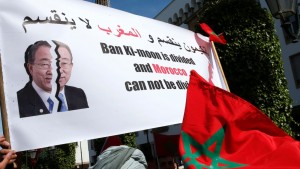Voice of America
by The Associated Press

Protesters hold a banner and the Moroccan flag at a rally in Rabat, Morocco, March 13, 2016, as they accuse U.N. Secretary-General Ban Ki-moon of “abandoning neutrality, objectivity and impartiality” during a recent visit to Western Saharan refugee camps in southern Algeria.
The Moroccan government is reducing its staff and support for the U.N. peacekeeping operation in the Western Sahara, to protest the U.N. secretary-general’s recent comments about the disputed territory.
Morocco also threatened to withdraw its 2,300 troops from all U.N. peacekeeping operations.
The unusual move is the latest step in an escalating dispute between Morocco and U.N. Secretary-General Ban Ki-moon. Ban recently visited Saharan refugee camps and referred to Morocco’s “occupation” of Western Sahara, a former Spanish colony that Morocco annexed in 1975. Morocco regarded the term as an insult.
Moroccans held a huge protest Sunday over the comments, organized by the country’s leading political parties, labor unions and NGOs. The next day, on the orders of Moroccan King Mohammed VI, Foreign Minister Salaheddine Mezouar went to the U.N. to meet with Ban, asking him to “publicly clarify” his position, the Foreign Ministry said.
Ban’s spokesman said the U.N. chief considers the attacks “disrespectful to him and to the United Nations.” He renewed a call for resumed peace negotiations.
Morocco remains angry, and late Tuesday the Foreign Ministry announced a reduction of its staff in the MINURSO peacekeeping mission and an end to the “voluntary contribution Morocco has accorded to the maintenance of MINURSO.” Moroccan funding will not “for the moment” be affected, according to a Foreign Ministry official who spoke on condition of anonymity because he wasn’t authorized to comment on the issue.
Morocco’s $3 million contribution to MINURSO has paid for food and housing for military observers, according to U.N. spokesman Stephane Dujarric.
He said the United Nations is assessing the potential impact of the Moroccan plans. If Morocco carries out all aspects of the announcement, he said, “we would obviously regret it.”
Asked whether this was the death knell of MINURSO, Dujarric said, “We very much hope this is not the end of the peace process.”
The status of the Western Sahara is among the most sensitive topics in the North African kingdom. Morocco considers the vast mineral-rich Western Sahara as its “southern provinces” and fiercely defends against anything it considers to be threats to its territorial integrity.
The dispute intensified as the Moroccan monarch visited Russia, a potential ally in the dispute.
Morocco has proposed wide-ranging autonomy for the region, but the Polisario wants self-determination through a referendum for the local population.
Established in 1991 after years of fighting between the Moroccan forces and the Polisario Front independence movement, MINURSO (the United Nations Mission for the Referendum in Western Sahara) lists 162 local civilian staff as of last year, of a total of 482 personnel members. MINURSO is currently headquartered in the city of Laayoune, the administrative capital of the Moroccan-controlled Western Sahara.
“The Kingdom of Morocco expresses its indignation at seeing the Secretary General challenge the legitimate and democratic right of a people to freely express their opinions and reactions,” the Moroccan government statement said.
A member of Polisario accused the Moroccan government of resorting to “pressure and blackmail.” Mohamed Sidati, the group’s delegate minister for Europe, said in a statement carried on its official news agency, Sahara Press Service, that the Moroccan move is a “sign of panic.”
Eric Goldstein, Human Rights Watch’s deputy director for the Middle East and North Africa, said that the anti-MINURSO measures “can only undermine Morocco’s international standing.”
He noted a series of past actions taken by Morocco to affirm what it considers its sovereignty over Western Sahara. Most recently, Morocco suspended contacts with the European Union after a December ruling by the European Court of Justice annulling a fisheries and agriculture agreement between Morocco and the EU because it included Western Sahara territory.






